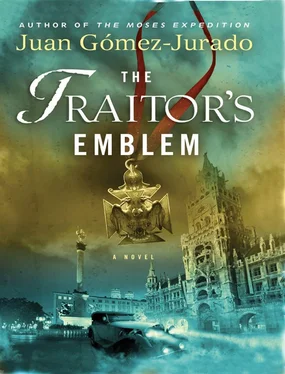Juan Gomez-Jurado - The Traitor's emblem
Здесь есть возможность читать онлайн «Juan Gomez-Jurado - The Traitor's emblem» весь текст электронной книги совершенно бесплатно (целиком полную версию без сокращений). В некоторых случаях можно слушать аудио, скачать через торрент в формате fb2 и присутствует краткое содержание. Жанр: Триллер, на английском языке. Описание произведения, (предисловие) а так же отзывы посетителей доступны на портале библиотеки ЛибКат.
- Название:The Traitor's emblem
- Автор:
- Жанр:
- Год:неизвестен
- ISBN:нет данных
- Рейтинг книги:4 / 5. Голосов: 1
-
Избранное:Добавить в избранное
- Отзывы:
-
Ваша оценка:
- 80
- 1
- 2
- 3
- 4
- 5
The Traitor's emblem: краткое содержание, описание и аннотация
Предлагаем к чтению аннотацию, описание, краткое содержание или предисловие (зависит от того, что написал сам автор книги «The Traitor's emblem»). Если вы не нашли необходимую информацию о книге — напишите в комментариях, мы постараемся отыскать её.
The Traitor's emblem — читать онлайн бесплатно полную книгу (весь текст) целиком
Ниже представлен текст книги, разбитый по страницам. Система сохранения места последней прочитанной страницы, позволяет с удобством читать онлайн бесплатно книгу «The Traitor's emblem», без необходимости каждый раз заново искать на чём Вы остановились. Поставьте закладку, и сможете в любой момент перейти на страницу, на которой закончили чтение.
Интервал:
Закладка:
Jurgen didn’t have high expectations. He was still taking sedatives for the pain his injury was causing him, and while they took the trolley toward the city center, he nervously touched the bulky bandage he would have to wear for a few more days.
And then a patch for the rest of my life, all because of that wretched pig Paul, he thought, feeling extremely sorry for himself.
To top it all, his cousin had vanished into thin air. Two of his friends had gone to spy on the stables and discovered that he no longer worked there. Jurgen suspected there would be no way of tracking Paul down in the short term, and this made his innards burn.
Lost in his hatred and self-pity, the baron’s son barely heard what Krohn was saying on their way to the Hofbrauhaus.
“He’s an extraordinary speaker. A great man. You’ll see, Jurgen.”
Nor did he pay any attention to the magnificent setting, an old beer factory built for the kings of Bavaria more than three centuries earlier, or to the frescoes on the walls. He sat next to Krohn on one of the benches in the enormous hall and sipped his beer in gloomy silence.
When the speaker Krohn had enthused about stepped up onto the stage, Jurgen thought his friend had gone crazy. The man walked like he had a bee sting on his arse, and looked nothing like a man with something to say. He exuded everything Jurgen despised, from his haircut and his moustache to his cheap crumpled suit.
Five minutes later, Jurgen was looking around in awe. The throng that gathered in the hall, no fewer than a thousand people, stood in total silence. Lips barely parted except to whisper “Well said” or “He’s right.” The crowd’s hands did the talking, marking each of the man’s pauses with loud clapping.
Almost against his will, Jurgen began to listen. He could barely understand the subject of the speech, because he lived on the periphery of the world that surrounded him, concerned only for his own amusement. He recognized loose fragments, snippets of phrases his father dropped during breakfast as he hid behind his newspaper. Curses on the French, the English, the Russians. Complete nonsense, all of it.
Out of that confusion, however, Jurgen began to extract a simple meaning. Not from the words, which he barely understood, but from the emotion in the little man’s voice, from his exaggerated gestures, from the clenched fists at the end of each line.
There had been a terrible injustice.
Germany had been stabbed in the back.
The Jews and the Masons had held that dagger in Versailles.
Germany was lost.
The blame for poverty, for unemployment, for the bare feet of German children fell on the Jews, who controlled the government in Berlin as if it were an enormous brainless marionette.
Jurgen, who didn’t care in the slightest about the bare feet of German children, who didn’t give a damn about Versailles-who never had concern for anyone who wasn’t Jurgen von Schroeder-found himself on his feet within fifteen minutes, applauding the speaker wildly. Before the speech had ended, he told himself he’d follow this man wherever he went.
After the meeting Krohn excused himself, saying he would be right back. Jurgen fell into silence until his friend tapped him on the back. He had brought over the speaker, who was looking poor and disheveled again, his stare shifty and distrustful. But the baron’s heir could no longer see him in that light, and stepped forward to greet him. Krohn said with a smile:
“My dear Jurgen, allow me to introduce you to Adolf Hitler.”
THE ENTERED APPRENTICE
1923
In which the initiate discovers a new reality with new rules
This is the entered apprentice’s secret handshake, used so that brother Masons can identify one another as such. It involves squeezing the thumb against the top of the knuckle of the index finger of the person being greeted, who will return the action. Its secret name is BOAZ, from the column that represents the moon in Solomon’s Temple. If a Mason has any doubts about another man who is claiming to be a brother Mason, he will ask him to spell this name out. Impostors begin with the letter B, while the true initiate starts with the third letter, thus: A-B-O-Z.
21
“Good afternoon, Frau Schmidt,” said Paul. “What can I get you?”
The woman cast a quick look around her, trying to give the impression that she was considering her purchase, but the truth was that she’d set her eyes on the sack of potatoes in the hope of finding a price tag. It was useless. Fed up with having to change their prices daily, Paul had started memorizing them every morning.
“Two kilos of potatoes, please,” she said, not daring to ask how much.
Paul began to pile the tubers onto the scale. Behind the lady a couple of boys were contemplating the sweets displayed in the window, their hands firmly stuffed in their empty pockets.
“They’re sixty thousand marks a kilo!” boomed a rough voice from behind the counter.
The woman barely looked at Herr Ziegler, the owner of the grocer’s shop, but her face went red in reaction to the high price.
“I’m sorry, madam… I don’t have many potatoes left,” lied Paul to save her the embarrassment of having to reduce her order. That morning he had worn himself out, piling up sacks and sacks of them out the back. “A lot of our regular customers are yet to come. Would you mind if I gave you just one kilo?”
Her look of relief was so obvious that Paul had to turn away to hide his smile.
“Fine. I suppose I’ll have to make do.”
Paul took a few potatoes from the bag until the scales settled at one thousand grams. He didn’t remove the last one, a particularly large specimen, from the bag completely but kept it in his hand while he checked the weight, then replaced it as he handed the potatoes over.
The action didn’t escape the woman, whose hand shook slightly as she paid and took the bag from the counter. As they were about to leave, Herr Ziegler called her back.
“Just one moment!”
The woman turned, pale.
“Yes?”
“Your son dropped this, madam,” said the shopkeeper, holding out the smallest boy’s cap.
The woman murmured her thanks and practically ran out.
Herr Ziegler headed back behind the counter. He adjusted his little round glasses and continued to rub the cans of peas with a soft piece of cloth. The place was spotless, as Paul kept it very clean, and in those days nothing stayed in the store long enough to gather dust.
“I saw you,” said the shopkeeper without looking up.
Paul took a newspaper out from under the counter and began to leaf through it. They would have no more customers that afternoon, as it was Thursday and most people’s wages had dried up several days earlier. But the following day would be hell.
“I know, sir.”
“So, why did you pretend?”
“It had to look as if you hadn’t noticed I was giving her the potato, sir. Otherwise we’d have to give a free one to everybody.”
“That potato will be coming out of your wages,” said Ziegler, trying to sound threatening.
Paul nodded and buried himself in his reading once again. He had ceased to be afraid of the shopkeeper long ago, not only because he never went through with his threats but also because his gruff exterior was just a front. Paul smiled to himself, remembering that just a minute earlier he’d spotted Ziegler putting a fistful of sweets in the boy’s cap.
“I don’t know what the hell you find so interesting in those newspapers,” said the shopkeeper, shaking his head.
What Paul had been frantically searching for in the papers for some time now was a way of saving Herr Ziegler’s business. If he didn’t find one, the shop would be bankrupt within the fortnight.
Читать дальшеИнтервал:
Закладка:
Похожие книги на «The Traitor's emblem»
Представляем Вашему вниманию похожие книги на «The Traitor's emblem» списком для выбора. Мы отобрали схожую по названию и смыслу литературу в надежде предоставить читателям больше вариантов отыскать новые, интересные, ещё непрочитанные произведения.
Обсуждение, отзывы о книге «The Traitor's emblem» и просто собственные мнения читателей. Оставьте ваши комментарии, напишите, что Вы думаете о произведении, его смысле или главных героях. Укажите что конкретно понравилось, а что нет, и почему Вы так считаете.












